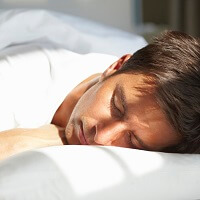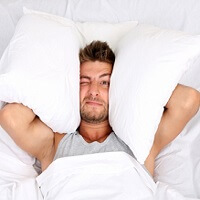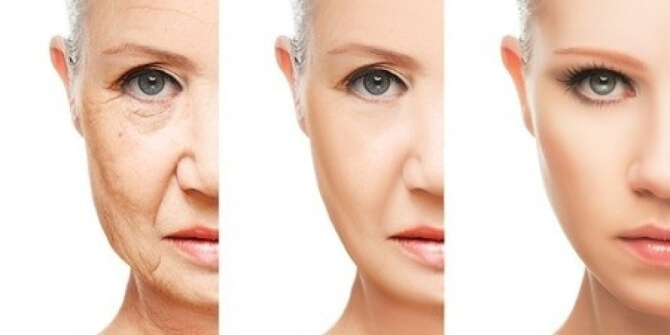It’s 2am in the morning and you are still wide-awake staring at the ceiling and it’s starting to get frustrating!

Whilst the rest of the house is fast asleep, you are laying there wondering when you will get a good night sleep again. But you are not alone with 30 to 40 per cent of UK adults suffering with some insomnia symptoms each year.
So for all insomniacs out there – and for anyone who occasionally can’t fall or stay asleep, we have rounded up the causes, effects and solutions.
Hopefully this will help you drift on into a natural and long nights sleep!
How much sleep do I need?
Most of us need around 7-8 hours of good quality sleep a night to function, but some need more or less. If you wake up tired and spend the day longing for a chance to take a nap, it’s likely that you aren’t getting enough sleep.
Symptoms of not getting enough sleep
– Difficulty falling asleep despite being tired
– Waking up frequently during the night
– Trouble getting back to sleep when awakened
– Exhausting sleep
– Having to reply on sleeping pills to fall asleep
– Waking up too early in the morning
– Difficulty concentrating throughout the day
– Daytime drowsiness, fatigue or irritability
RECOMMENDED: Lavender Essential Oil from Fushi
Why am I not getting enough sleep?
 There are many reasons why you may not be drifting off to sleep as you normally would. In order to be able to properly cure your sleeping troubles you need to find out the root cause. Your daytime habits, sleep routine and physical health may play a role in why you aren’t getting enough sleep.
There are many reasons why you may not be drifting off to sleep as you normally would. In order to be able to properly cure your sleeping troubles you need to find out the root cause. Your daytime habits, sleep routine and physical health may play a role in why you aren’t getting enough sleep.
We have put together some questions you can ask yourself to help you pinpoint what could be making you sleep deprived:
– Are you under a lot of stress? From work, home life etc.?
– Are you depressed or feel emotionally hopeless?
– Do you struggle with chronic feelings of anxiety and worry?
– Are you taking any mediation that could be affecting you sleeping?
– Is your sleep environment quiet and comfortable?
– Do you try to go to bed and get up at the same time everyday?
– Are you spending enough time in the sunlight during the day and in darkness at night?
– Do you have any health problems that may be interfering with your sleep?
If you can relate to 1 or more of the above questions, then chances are this is the reason you are having trouble sleeping.
Side effects to not getting enough sleep
 An occasional night without sleep makes you feel tired and irritable the next day, but it won’t harm your health. After several sleepless nights, the mental effects can become more serious.
An occasional night without sleep makes you feel tired and irritable the next day, but it won’t harm your health. After several sleepless nights, the mental effects can become more serious.
You may notice you have a shorter temper, fatigue, your brain will fog, making it difficult to concentrate and make decisions. You may start to feel down, wanting to fall asleep during the day to make up for the sleepless nights you have been experiencing. Your immune system will also be more prone to colds as sleep enables your body to rest and recuperate.
Your risk of injury and accidents at home, work and on the road will also increase if you aren’t getting a proper nights sleep.
If your sleepless nights continue, then this can affect your overall health and make you prone to more serious medical conditions such as obesity, heart disease, high blood pressure and diabetes.
What can I do to help myself get a better night sleep?
– Make sure your bedroom is quiet, dark and cool. Noise, light and heat can interfere with sleep. Try using earplugs to hide outside noise, an open window to keep the room cool, and blackout curtains or a sleep mask to block out light
– Stick to a regular sleeping routine. Support your biological clock by going to bed and getting up at the same time everyday, including weekends, even if you are tired. This will help you get back into a regular sleeping rhythm.
– Avoid taking a nap. Avoid napping during the day as this can make it more difficult to sleep at night. If you feel like you have to take a nap, limit it to 30 minutes before 3pm.
– Don’t read from a backlit device (iPad, iPhone). Technology is one of the most common causes for keeping people awake after bedtime hours. Avoid laptops, phones and tablets after 9pm. If you use an ereader, opt for one that is not backlit, for example; one that requires an additional light source.
– Limit caffeine, alcohol and nicotine. Stop drinking caffeinated drinks at least eight hours before going to sleep. Avoid drinking alcohol in the evening; whilst alcohol can make you feel sleepy, it interferes with the quality of your sleep. Quit smoking or avoid it at night, as nicotine is a stimulant.
SEE ALSO: Technology is making your skin age!
Now that we have gone through the side effects and causes of not getting enough sleep, lets take a look at why a good nights sleep is so important…
– Sleep boosts immunity (you will become less prone to colds and flu like symptoms)
– Sleep can slim you down
– Sleep boosts your mental well being
– Sleep helps to prevent diabetes
– Sleep increases your fertility



